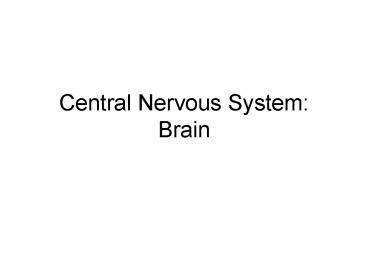Central Nervous System: Brain - PowerPoint PPT Presentation
1 / 23
Title:
Central Nervous System: Brain
Description:
Alzheimer's. Epilepsy. Chronic disorder: recurrent, unprovoked seizure activity ... Alzheimer's Disease. Chronic, progressive, degenerative disease. Manifestations ... – PowerPoint PPT presentation
Number of Views:489
Avg rating:3.0/5.0
Title: Central Nervous System: Brain
1
Central Nervous System Brain
2
Neurologic Assessment Mental Status
- Level of Consciousness (LOC)
- Orientation
- Memory
- Remote
- Long-term
- Recall (recent)
- Immediate (new)
- Attention
- Language and copying
- Cognition
3
Neurologic Assessment
- Cranial nervew
- Sensory function
- Pain and temperature
- Touch
- Abnormal sensory findings
- Motor function
- Muscle strength
- Cerebral/brainstem integrity
- Abnormal motor findings
4
Neurologic Assessment Cerebellar Function
- Coordination
- Gait and equilibrium
- Rombergs sign
- Proprioceptive awareness
- Reflex activity
- Deep tendon reflexes (DTRSs)
- Cutaneous reflexes
- Babinskis sign
- Abnormal reflex findings
5
Neurologic Assessment Cerebellar Function
- Rapid neurologic assessment
- Response to painful stimuli
- Level of consciousness
- Pupil assessement
6
Glascow Coma Scale (GCS)
- Eye opening
- Spontaneous 4
- To sound 3
- To pain 2
- Never 1
- Motor Response
- Obeys commands 6
- Localizes pain 5
- Normal flexion 4
- Abnormal flexion 3
- Extension 2
- Nil 1
- Verbal response
- Oriented 5
- Confused conversation 4
- Inappropriate words 3
- Incomprehensible sounds 2
- None 1
- The highest possible score is 15
7
Neurologic Disorders of the Brain
- Epilepsy
- Meningitis
- Parkinsons
- Alzheimers
8
Epilepsy
- Chronic disorder recurrent, unprovoked seizure
activity - Due to brain or CNS irritation
- Seizures abnormal, sudden, excessive discharge
of electrical activity - Epileptic
- Primary/idiopathic
- Secondary underlying brain lesion
9
Epilepsy
- Seizures
- Nonepileptic
- Metabolic disorders
- Acute alcohol withdrawal
- Electrolyte disturbance (hyperkalemia, water
intoxication, hypoglycemia - Heart disease
- Risk Factors can trigger seizure activity
- Increased physical activity
- Emotional stress
- Excessive fatigue
- Alcohol, caffeine, or certain foods or chemicals
10
Types of Seizures
- Generalized
- Tonic-clonic (f.k.a. grand mal)
- Tonic
- Clonic
- Absence (f.k.a. petit mal)
- Myoclonic
- Atonic (akinetic) (f.k.a. drop attack)
- Partial (focal)
- Complex partial
- Simple partial
11
Seizure Interventions
- Nonsurgical management
- Drug therapy
- Seizure precautions
- Seizure management
- Preictal phase
- Postictal phase
- Acute seizures
- Status epilepticus
- Vagal nerve stimulation
- Surgical management
12
Meningitis
- Inflammation of arachnoid/pia mater of brain,
spinal cord and CSF - Most often due to bacterial and viral organisms
- Enters CNS through blood stream at the
blood-brain barrier - Direct routes
- Penetrating trauma -- ruptured cerebral abcess
- Surgical procedure -- otorrhea/rhinorrhea
- Exudate may spread to cranial/spinal nerves
neurologic deterioration
13
Meningitis Bacterial
- Occurs most often in fall and winter with URIs
- Organisms
- Streptococcus pneumonae
- Neisseria meningitidis
- Haemophilus influenzae
- Risk factor cigarette smoking
- Occurs in areas of high population density
- Predisposing conditions
14
Meningitis
- Viral
- Aseptic meningitis
- Sequela to viral illnesses measles, mumps,
herpes simple/zoster - Inflammation over cerebral cortex/white
matter/meninges - Patho varies depending on virus
- Fungal
- Cryptococcus neoformans most common in clients
with AIDS - Headaches, nausea, vomiting, decline in mental
status
15
Meningitis Assessment
- Meningeal irritation
- Nuchal rigidity
- Kernigs sign
- Brudzinski refles
- Increased intracranial pressure
- Hydrocephalus/cerebral edema
- Herniation of brain/death
- Seizure activity
- SIADH
- Vascular dysfunction
16
Meningitis Interventions
- Neurologic assessment
- Monitoring for complications
- Septic emboli -- Coagulation disorders
- Shock -- Prolonged fever
- Septic complications (bacterial endocarditis)
- Drug therapy
- Broad spectrum antibiotics -- Steroids
- Hyperosmolar agents -- Anticonvulsants
- Prophylaxis with rifampin for close contacts
17
Parkinsons Disease
- (Paralysis agitans) second most common neurologic
degenerative disease - Cardinal symptoms
- Muscle rigidity
- Bradykinesia
- tremor
- Genetic defect of chromosome 4
- Occurs most often in people over 50
- Widespread degeneration of substantia nigra
decreased dopamine
18
Parkinsons Disease (continued)
- Decreased dopamine decreased ability to refine
voluntary movement - Imbalances between excitatory and inhibitory
neuronal activity - Increased excitation of neurons prevents
controlling/initiating voluntary movements - Stages 1 - 5
19
Parkinsons Disease Assessment
- Early symptoms fatigue, slight tremor, problems
with manual dexterity - Rigidity
- Cogswheel
- Plastic
- Lead pipe
- Masklike facial expression
- Wide-open, fixed, staring eyes
- Difficulty chewing and swallowing
- Uncontrolled drooling
- No specific diagnostic tests
20
Parkinsons Disease Interventions
- Nonsurgical management
- Drug therapy
- Exercise/ambulation
- Self-care
- Nutrition
- Communication
- Psychosocial support
- Surgical management
- Stereotactic pallidotomy
- Thalamotomy
- Deep brain stimulation (DBS)
- Fetal tissue transplant
21
Alzheimers Disease
- Chronic, progressive, degenerative disease
- Manifestations
- Loss of memory, judgment, and visuospatial
perception - Changes in personality
- Progressive cognitive impairment
- Severe physical deterioration
- Structural/chemical changes in the brain
- Exact cause unknown
22
Alzheimers Disease (continued)
- Theories/risk factors
- Genetics
- Chemical imbalances
- Environmental agents
- Immunologic changes
23
Alzheimers Disease Nursing Diagnoses
- Chronic confusion
- Risk for injury
- Compromised family coping
- Disturbed sleep pattern
- Impaired verbal communication
- Imbalanced nutrition
- (Self-care deficit)































